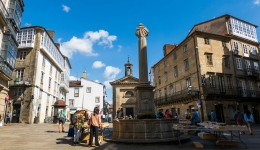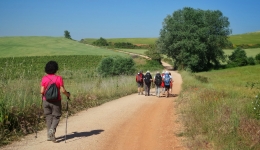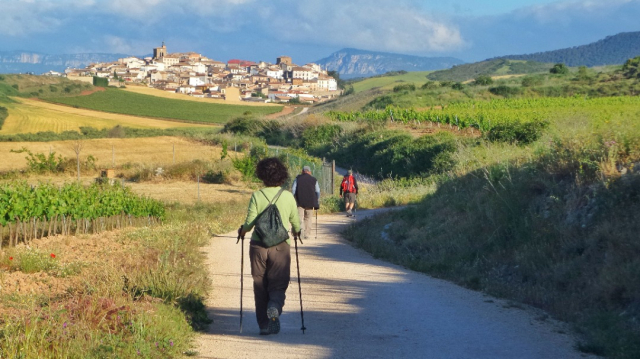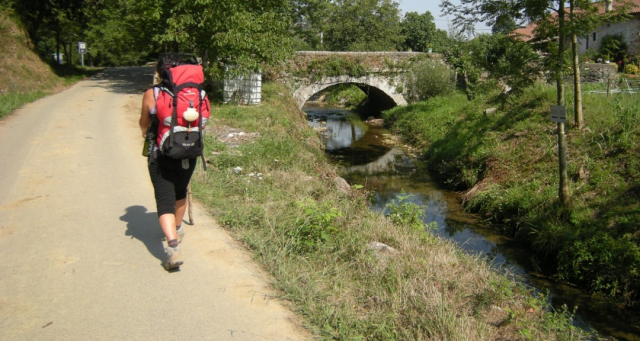Women pilgrims on the Camino de Santiago
Women not only undertake the Camino for religious or spiritual reasons, but also for personal reasons, such as the desire to improve.
The Camino de Santiago is an ancient pilgrimage route, bringing together thousands of people from all over the world every year who decide to travel to the cathedral of Santiago de Compostela. A place that has witnessed countless stories and has united people from all corners of the planet on a spiritual and physical journey. For centuries, pilgrims of various nationalities, classes and ages have undertaken this journey in search of redemption, self-discovery or simple adventure.
However, a particular trend has been gaining strength in recent decades: the constant increase in women who decide to venture along the Camino trails. These women pilgrims, armed with determination and courage, have redefined the Camino experience, providing new perspectives and facing unique challenges. Whether they were pilgrims who began their journey centuries ago, or the most recent ones, the Camino de Santiago has been led by brave women who, in some cases, have wanted to remain anonymous. < /p>
The challenges of the first women pilgrims
At the dawn of the Camino de Santiago, during the Middle Ages, undertaking the pilgrimage route was not an easy task for anyone, and even less so for women. These first pilgrims, in many cases, had to face not only the physical adversities of the journey, but also the social and cultural barriers of a time in which traveling alone or without an "appropriate" purpose for A woman could be viewed with suspicion or even condemnation.
Some of the first women pilgrims were noble ladies who undertook the Camino in the company of large delegations. There were also women who did it as an act of penance or in fulfillment of a religious vow. But, regardless of their status or motive, these women faced particular challenges: from From the pressure of maintaining an "immaculate reputation" to practical difficulties, such as finding suitable accommodation at a time when hostels were not as common.
In addition, the social perception of female pilgrims in the Middle Ages was colored by a series of stereotypes and prejudices. While some were revered for their devotion and courage, others were the subject of rumors or gossip. However, despite these challenges, many women found on the Camino a form of self-discovery, faith, and, at times, liberation from the strict norms of their time.
The chronicles and historical records tell us about women like Doña Urraca, who made a pilgrimage to from Zamora, or Queen Isabella of Portugal, known for her deep faith and devotion. These pilgrims, whether noble or commoner, laid the foundation for future generations of women who would continue to seek meaning and purpose on the ancient route to Santiago de Compostela.
Pioneer women pilgrims on the Camino de Santiago
The pioneering women pilgrims who undertook the Camino de Santiago challenged the conventions of their time and created a legacy that has inspired countless travelers in the centuries since. Although history has often overshadowed their names and exploits, these women left indelible marks on the history of the Camino.
Doña Urraca de Zamora
One of the most emblematic figures of the Camino. It is said that he made a pilgrimage from Zamora, a remarkable feat given its position of nobility. Her journey not only represented An act of faith, but also of courage at a time when the routes could be dangerous and women travelers were scarce.
Saint Elizabeth of Portugal
Known for her deep religious devotion, Queen Isabella of Portugal is another unique iconic figure associated with the Camino. It is said that he performed the pilgrimage anonymously , stripping herself of her royal rank to mix with other pilgrims and live the experience in the purest essence of her.
Egeria
A 4th century traveler, although not exactly a pilgrim on the Camino de Santiago, Egeria is essential in the history of women pilgrims. She is known for her extensive journey to the Holy Land and for the detailed letters she wrote. describing her experiences. Her pioneer spirit and her writings have served as inspiration for many women who decided to undertake the Camino in subsequent centuries.
Beyond Of the well-known figures there were many women whose names or stories were not recorded, but who were equally brave. These women, whether nobles who traveled with a delegation or humble commoners who undertook the journey alone or in groups, silently contributed to the rich history of the Camino de Santiago.
Gilberta of Flanders
It is a name that resonates in the history of the Camino de Santiago, although not as well known as others, her story is especially significant. Gildeberta (also known as Godeleva) was one of the first pilgrims to record her journey in the 11th century. Coming from a noble family in Flanders, this woman undertook the pilgrimage to the sanctuary of Santiago de Compostela, an act that in itself It was quite rare for women of her status back then.
The routes of the Camino de Santiago, steeped in centuries of history and tradition, continue to attract thousands of pilgrims each year. And in this constant flow, women pilgrims of the 21st century have become prominent protagonists. Their presence on the Camino not only symbolizes the continuation of a legacy, but also reflects the changes and advances in gender equality and female empowerment in contemporary society.
Today, women not only undertake the Camino for religious or spiritual reasons, but also for personal reasons, such as the desire to improve, the search for introspection or simply the passion for adventure. . With the rise of social media and blogging platforms, many of these modern pilgrims document and share their experiences in real time, inspiring other women around the world to embark on their own adventure. These digital narratives, full of anecdotes, challenges overcome and lessons learned, further enrich the vast presence of women's stories on the Camino.
Routes
Blog
 How to get to Sarria to do the Camino de Santiago
How to get to Sarria to do the Camino de Santiago
 Descubre la magia del Camino de Santiago Portugués por la costa
Descubre la magia del Camino de Santiago Portugués por la costa
 5 tours culturales que puedes hacer en Galicia si decides hacer un alto en el camino
5 tours culturales que puedes hacer en Galicia si decides hacer un alto en el camino
 Doing the Camino de Santiago in June: What you should know?
Doing the Camino de Santiago in June: What you should know?
Information
Points of interest
Cities & Towns | Hostels | Lodgings | Restaurants | Saddlery | Doctors | Points of interest | Bikes workshop
Contact us | Privacy policy | Cookies policy | | Terms of use | Authorship | Web Map | Consentimiento
© Copyright LA VOZ DE GALICIA S.A. Polígono de Sabón, Arteixo, A CORUÑA (ESPAÑA) Inscrita en el Registro Mercantil de A Coruña en el Tomo 2438 del Archivo, Sección General, a los folios 91 y siguientes, hoja C-2141. CIF: A-15000649
Developed and managed byHyliacom


